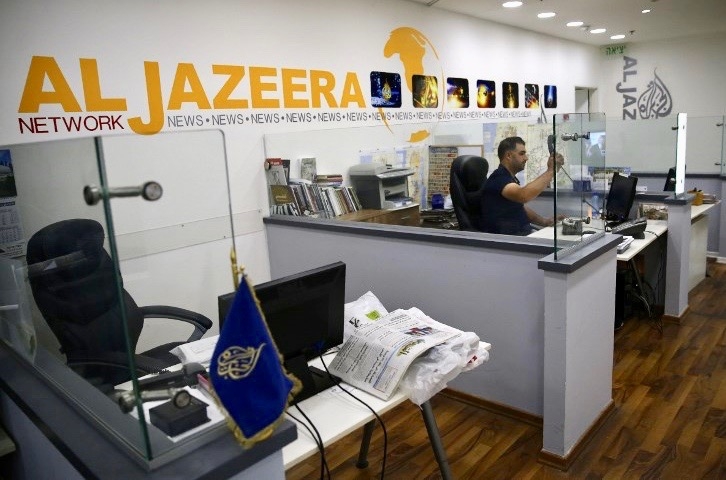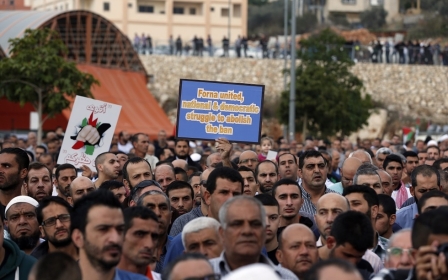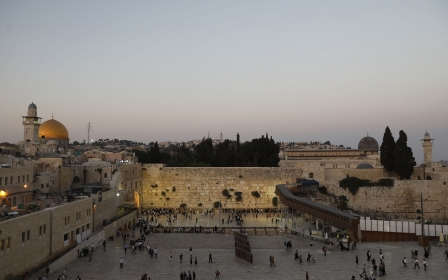Israel moves to shut Al Jazeera's office and ban journalists

Israel confirmed that it is seeking to shut down Al Jazeera's offices in Jerusalem and revoke the credentials of its journalists.
Israeli communications minister Ayoub Kara made the announcement on Sunday during a news conference, where he said that he intended to lodge a request to revoke the credentials of all Al Jazeera journalists and close down the network's office in Jerusalem.
Kara accused the station of "supporting terrorism" and said cable broadcasters had agreed to his proposal to take the station's Arabic and English channels off the air. Closure of the station's office will require further legislation, he said.
The revocation of credentials includes journalists from Al Jazeera's Arabic and English news networks.
According to Al Jazeera, the Israeli authorities had also sought to shut down the network's satellite transmission into the country.
In a statement on Monday morning, Al Jazeera denounced "this decision made by a state that claims to be 'the only democratic state in the Middle East'".
"During the press conference, [Kara] could not substantiate his comments by referring to a single news bulletin or situation that proved Al Jazeera had not been professional nor objective during its coverage in Jerusalem."
The head of the Israeli Government Press Office (GPO), Dr Nitzan Hen, said that according to GPO rules, press cards are not permitted if they might be a "risk to national security".
Hen said the GPO had sent a request to Israeli security agencies to assess the security risk involved with Al Jazeera and will make its decision based on that.
Israeli Prime Minister Benjamin Netanyahu has been threatening to shut Al Jazeera's operations in the country, accusing the network of inciting violence against Israel.
That includes Al Jazeera's reporting on recent protests over Israeli security measures at the Al-Aqsa Mosque compound in the Old City of Jerusalem.
Jamal Zahalka, an Arab Israeli and member of the Knesset representing the Balad party, told MEE: “Netanyahu is obsessed with controlling the Israeli media. He tried to control the Yediot Aharonot newspaper, and he also tried to change the laws concerning the media association.
“Now it's time to control the international media; of course he will not dare to touch CNN or the BBC, but he is using the current Gulf crisis to close Al Jazeera and to silence the free media and leave the stage only for Israel,” Zahalka said.
The channel's Jerusalem bureau chief, Walid al-Omari, said his office had not received any official notification that it would be forced to close.
Speaking on Al Jazeera, he said the move was related to internal Israeli politics.
"Netanyahu wants to distract attention from issues he is facing," he said, in an apparent reference to ongoing investigations into graft cases allegedly involving the premier.
Al Jazeera said it "deplores" Israel's decision to close the broadcaster's offices and will pursue the matter through legal channels, an official at the Doha-based news channel said.
"Al Jazeera deplores this action from a state that is called the only democratic state in the Middle East and considers what it has done is dangerous," said the official, who declined to be identified.
He said the broadcaster "will follow up the subject through appropriate legal and judicial procedures".
Saudi Arabia and Jordan both shut down Al Jazeera bureaus as part of the current Gulf crisis, the diplomatic and economic campaign against Qatar, home to Al Jazeera's headquarters.
Al Jazeera's signal has also been blocked in the United Arab Emirates.
Egypt, which is also part of the blocking group, banned Al Jazeera several years ago.
“Israel also wants to be part of the Arab countries coalition against [Al Jazeera], these countries that are not democratic, that don't support democracy,” Zahalka said.
New MEE newsletter: Jerusalem Dispatch
Sign up to get the latest insights and analysis on Israel-Palestine, alongside Turkey Unpacked and other MEE newsletters
Middle East Eye delivers independent and unrivalled coverage and analysis of the Middle East, North Africa and beyond. To learn more about republishing this content and the associated fees, please fill out this form. More about MEE can be found here.




